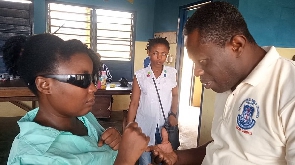Sylvia Abena Peprah’s story as the first of her kind to attain high academic heights drew this Correspondent close to her to unearth the secrets behind her success.
The 34-year-old deafblind young woman from Breman-Asikuma in the Central Region lived her life as a normal child until age seven when a strange illness led to her admission at the Korle-Bu teaching hospital. Upon recovery however, the young girl lost her hearing and visual ability and her speech to a large extent.
Detailing her early educational background, Sylvia speaking through, Mr. Theodore Akleih, one of her former instructors at the deafblind department of the Demonstration School for the Deaf at Mampong-Akuapem in the Akuapem-North District of the Eastern Region where she currently offers voluntary service, said she began her early education as a normal child.
Sounding faintly audible in her narration, Sylvia said, “I started normal school when I was a child before I started special school, because that time I was seeing and hearing so I attended normal school…Later on I fell ill and became deaf and blind.”
After successfully writing her BECE at the Demonstration School for the Deaf, she was subsequently introduced to the School for the Blind at Akropong, also in the Akuapem-North for her senior high school education. There she studied general arts, history and economics and CRS which she completed in 2016.
She thereafter offered voluntary work at the center for blind children before proceeding to the University of Education Winneba in 2017 to pursue a two-year diploma programme in Community-Based Rehabilitation and Disability Studies.
Sylvia graduated with First Class honours from the University of Education Winneba (UEW) in 2019 after pursuing a two-year diploma programme in Community-Based Rehabilitation and Disability Studies.
Determined to further her academic pursuits, the young woman furthered her quest for a degree as she pursued her post-diploma programme, in the same course at same university where she obtained a Bachelor of Education with a Second Class Lower and thereafter did her national service at her alma mater, the Demonstration School for the Deaf.
Then institution provided Sylvia with the platform to prove to Ghana that the loss of both her sight and hearing was not a barrier to her attaining University education.
Currently waiting for government employment after her national service, the young woman occupies her time doing voluntary work with the Deafblind Department of the Demonstration School for the Deaf.
Here, she provides assistance to the department’s efforts to train the young deafblind students currently undergoing training at the facility.
“I’m waiting for government employment that is why I’m here to offer volunteering work to the deafblind children,” she said.
Sylvia’s future aspirations include working with the Ghana Education Service, particularly with deafblind children and establish an NGO to support deafblind children in Ghana.
Despite society’s perception of persons like Sylvia as being incapable in various ways, the deafblind graduate says the contrary is the reality.
Unable to see nor hear, Sylvia, like other deafblind persons need some introduction to know whom they’re communicating with. She said persons who want to communicate with her must come close to her, touch her hands to notify her that they want to talk to her.
To keep her occupied and raise some capital, she crafts some artworks such as doormats, bed mats, praying mats for Muslims amongst others which she produces from fabric.
She stressed that children with disabilities must be sent to school like other children to access education or some training.
Her message to society is simple, “I want to tell people that people with disabilities especially deafblind children, they must bring the children to school because schooling is very important for all children in the world.”
She added that sending kids with such conditions to school is very important as they acquire a lot of knowledge and skills which they won’t acquire if they remained home.
“If you have a child with disability and you send him to school, teachers are there to train the children or help them to develop their potentials, they acquire a lot of skills,” she said.
Citing herself as an example, Miss Peprah said being brought to the center helped her acquire those communication skills.
She said though her family failed to support her in the beginning, her instructors at the deafblind department encouraged her family to give her the necessary assistance.
Sylvia is yet to meet the man of her dreams. Asked if she has men approaching or expressing interest in her, she answered in the negative but hopes to in the near future meet a caring man whom she would get married to.
“Now, I’m not married, I want God to lead me to a good husband who’ll stay with me forever,” she said.
Appeals for braille computer, sight guide
Sylvia is capable of and undertakes some basic responsibilities including cooking, washing, sweeping and cleaning and others.
Nevertheless, she currently has a personal sight guide who voluntarily supports her in her day-to-day activities. However, she needs some assistance to employ a full-time personal guide and interpreter.
“I have problem with a sight guide, I need somebody to guide me and an interpreter so I want someone to help me pay that person, I’d be happy. I can’t see, I can’t hear, I depend on people for all my activities, I want government to help me,” she appealed.
She also appealed for a braille computer to enable her lead an independent life.
Regional News of Monday, 1 May 2023
Source: www.ghanaweb.com

















